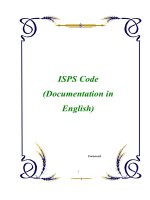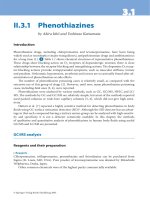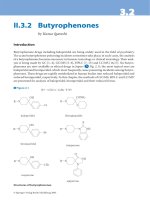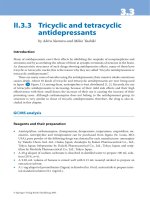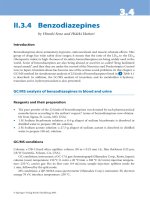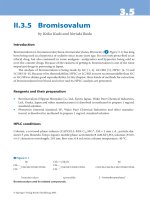Tài liệu LAW AND EMPIRE IN ENGLISH RENAISSANCE LITERATURE pptx
Bạn đang xem bản rút gọn của tài liệu. Xem và tải ngay bản đầy đủ của tài liệu tại đây (1.26 MB, 248 trang )
This page intentionally left blank
LAW AND EMPIRE IN ENGLISH RENAISSANCE
LITERATURE
Early modern literature played a key role in the formation of the legal
justification for imperialism. As the English colonial enterprise developed,
the existing legal tradition of common law no longer solved the moral
dilemmas of the new world order, in which England had become, instead
of a victim of Catholic enemies, an aggressive force with its own overseas
territories. Writers of romance fiction employed narrative strategies in
order to resolve this difficulty and, in the process, provided a legal basis
for English imperialism. Brian C. Lockey analyzes works by such authors
as Shakespeare, Spenser, and Sidney in the light of these legal discourses,
and uncovers new contexts for the genre of romance. Scholars of early
modern literature, as well as those interested in the history of law as the
British Empire emerged, will learn much from this insightful and
ambitious study.
brian c. lockey is Assistant Professor of English at St. Johns
University, New York. He has published articles in the Journal of the
History of Ideas, English Literary Renaissance, and the Journal for Early
Modern Cultural Studies.
LAW AND EMPIRE IN ENGLISH
RENAISSANCE LITERATURE
BRIAN C. LOCKEY
cambridge university press
Cambridge, New York, Melbourne, Madrid, Cape Town, Singapore, São Paulo
Cambridge University Press
The Edinburgh Building, Cambridge cb2 2ru, UK
Published in the United States of America by Cambridge University Press, New York
www.cambridge.org
Information on this title: www.cambridge.org/9780521858618
© Brian C. Lockey 2006
This publication is in copyright. Subject to statutory exception and to the provision of
relevant collective licensing agreements, no reproduction of any part may take place
without the written permission of Cambridge University Press.
First published in print format 2006
isbn-13
isbn-10
978-0-511-24542-8 eBook (EBL)
0-511-24542-4 eBook (EBL)
isbn-13
isbn-10
978-0-521-85861-8 hardback
0-521-85861-5 hardback
Cambridge University Press has no responsibility for the persistence or accuracy of urls
for external or third-party internet websites referred to in this publication, and does not
guarantee that any content on such websites is, or will remain, accurate or appropriate.
For Olivia and Benjamin
Contents
Acknowledgments
page viii
Introduction: Romance and the ethics of expansion
part i romance and law
1
15
1
Transnational justice and the genre of romance
17
2
Natural law and charitable intervention in Sir Philip
Sidney’s Old Arcadia
47
Natural law and corrupt lawyers: Riche, Roberts,
Johnson, and Warner
80
3
4 Spenser’s legalization of the Irish Conquest
113
part ii the prerogative courts and the conquest
within
143
Historical contexts: common law, natural law, civil law
145
6 Roman Conquest and English legal identity in Cymbeline
160
7 Love’s justice and the freedom of Brittany in Lady Mary
Wroth’s Urania part I
187
Conclusion: English law and the early modern romance
219
Index
231
5
vii
Acknowledgments
It is with great pleasure that I acknowledge and thank my mentors, Derek
Attridge, Ronald Levao, Bridget Gellert Lyons, Jacqueline T. Miller, and
Michael McKeon, who have supported this project from its beginning to
the present day. Although I did not realize it at the time, this book also
owes a substantial debt to my participation in Constance Jordan’s Folger
Institute Seminar (Fall, 1994), which helped me to formulate an
intellectual framework from which to consider intersections between
fictional works and legal discourse.
While living an itinerant existence across two continents, I have had
the good fortune to encounter a number of wonderful people who have
helped and encouraged me. My warmest thanks go to the following
friends and colleagues: J. Leeds Barroll, Gwendolyn Bradley, Chiara
Cillerai, Florian Ehrensperger, Stephen Fallon, Bernd Goebel, Brian Goss,
ă
Ruth Groenhout, Vittorio Hosle, Slavica Jakelic, Lara Mancuso, Anne
ă
McCabe, Sabine McCormick, Elod Nemerkenyi, Dianne Philips, Robert
E. Rodes, Jr., Vincent D. Rougeau, and James Turner. I owe a special
word of thanks to Jacqueline T. Miller, Paul Vita, and Anne Dewey for
valuable advice at critical stages of revision. I would like to thank my
family, especially Anne, Richard, Keith, Carol, Jack, Betty, and Stephen,
for their unfailing encouragement and support of my educational
pursuits. Most of all, I am grateful to my wife, Chiara Cillerai, for
countless hours of editorial help, loving guidance and unwavering
support throughout some very challenging years.
I have been fortunate to have benefited from generous institutional
support over the years. The graduate school at Rutgers University, New
Brunswick provided me with two years of dissertation fellowship. The
Madrid, Spain Campus of Saint Louis University afforded me time off
from teaching. Finally, I owe my deepest gratitude to the University of
Notre Dame and San Francisco State University for support during the
2002–3 academic year during which I was a Junior Faculty Fellow at the
viii
Acknowledgments
ix
Erasmus Institute at Notre Dame. I would like to extend a special word of
thanks to James Turner, Diane Philips, and Terri O’Bryan of the
Erasmus Institute for the hospitality they showed to my family and me
during our year in South Bend, Indiana.
A version of chapter 4 originally appeared under the title, ‘‘Spenser’s
Legalization of the Irish Conquest in A View and The Faerie Queene vi,’’
in English Literary Renaissance 31.3 (Fall 2001): 365–91, and chapter 6 was
first published as ‘‘Roman Conquest and English Legal Identity in
Cymbeline,’’ in the Journal for Early Modern Cultural Studies 3.1 (Spring
2003): 113–47. Both are reprinted with the permission of the editors.
Introduction: Romance and the
ethics of expansion
On November 10, 1580 at the Golden Fort in Smerwick on the coast of
Ireland, Lord Deputy Arthur Grey of Wilton ordered his troops to
execute 600 Italian and Spanish soldiers who had just surrendered. These
continental soldiers had recently occupied the fort in order to assist the
Earl of Desmond’s rebellion against English rule. Reporting to Queen
Elizabeth, Lord Grey later wrote that, after the surrender, he purposefully
sent into the fort ‘‘certain bands, who straight fell to execution. There
were 600 slain.’’1 According to the official report to Sir Francis Walsingham, ‘‘all the Irish men and women [were] hanged, and four hundred
and upwards of Italians, Spaniards, Biscayans, and others put to the
sword.’’2 The slaughter occurred despite the fact that, according to many
witnesses and popular tradition, the Italian commander negotiated an
agreement with Lord Grey under which his soldiers would be taken alive
and ultimately allowed to return safely to Spain.3
One way of viewing this atrocity is that it was one unremarkable
massacre in a long series of such episodes that comprised the ‘‘scorchedearth’’ strategy that Grey employed to put down the Earl of Desmond’s
rebellion.4 Even so, contemporary standards on military discipline
were quite clear in prohibiting the execution of prisoners of war. Such
1
2
3
4
Lord Grey to Queen Elizabeth, 12 November, 1580, Calendar of State Papers, Ireland 1574–85 (ed.)
Hans Claude Hamilton (London: Longmans, Green, Reader, and Dyer, 1867), p. lxxiii. See also
pp. lxix–lxxvi, 267.
Official Report to Walsingham, 11 November, 1580, cited in Alfred O’Rahilly (ed.), The Massacre at
Smerwick (1580) (New York: Longmans, 1938), pp. 4–5.
See News from Madrid sent to Rome, 1580; Letter of Dr. Sanders, 9 January, 1581, both cited in
O’Rahilly (ed.), The Massacre at Smerwick, pp. 6–7; 7–8. For other accounts, see pp. 8–21, and for
O’Rahilly’s conclusions, see pp. 32–34. See also Bernadino de Mendoza to the King of Spain,
11 December, 1580, Calendar of State Papers, Spain, 1580–86, ed. Martin A. S. Hume (London: Eyre
and Spottiswoode, 1896), vol. iii, pp. 69–70.
G. A. Hayes-McCoy, ‘‘The Completion of the Tudor Conquest, and the Advance of the CounterReformation, 1571–1603,’’ in A New History of Ireland, ed. T. W. Moody et al. 9 vols. (New York:
Oxford University Press, 1976), vol. iii, p. 108.
1
2
Law and Empire in English Renaissance Literature
standards point to the existence of a distinction between real warfare and
its ideal or juridical incarnation, a distinction found throughout
European thought during the Renaissance. In imperial Spain, for example,
the brutal and immoral actions of the conquistadors stood in stark contrast to the moralistic just-war theory formulated by contemporary
Spanish Dominicans, who condemned the cruelty of the New World
conquests in lucid juridical terms.5 England followed Spain in this respect
as it did in so many others. Comments by Barnabe Riche are a case in
point. Riche, himself an experienced English soldier, was at the time of
the Smerwick massacre on duty nearby in Limerick ‘‘with certaine
companies of English Souldiers.’’6 Later in the decade, his name appears
in the rolls of Sea Captains alongside the name of Sir Walter Ralegh, then
a young English officer who had either witnessed the Smerwick massacre
or had been a major participant in the killing itself.7 Despite being
involved in the very same military campaign, however, Riche’s recommendations for the treatment of prisoners of war were very different from
Grey’s treatment of the Italian and Spanish prisoners. In the Allarme to
England (1578), Riche’s early tract on the importance of military discipline, Riche exalts those military commanders who treated prisoners of
war humanely and condemns those who slew them. He writes in special
praise of Marcus Aurelius for ‘‘ministring of comfort, to such as [the
Romans] had alreadie vanquished and subdued.’’8 Likewise in 1589, an
Italian civil lawyer named Alberico Gentili, who at the time of the
Smerwick massacre had just begun teaching law at Oxford University,
wrote an important legal treatise in which he outlined both the ius ad
bellum [justification for war] as well as the ius in bello [laws followed
5
6
7
8
See especially, Francisco de Vitoria, On the American Indians, in Political Writings, ed. Anthony
Pagden and Jeremy Lawrance (New York: Cambridge University Press, 1991), pp. 287–88, and
Francisco Suarez, A Work on the Theological Virtues: Faith, Hope, and Charity, in Selections from
Three Works, ed. James Brown Scott, 2 vols. (Oxford: Clarendon Press, 1944), vol ii, p. 826. For the
origins and history of this tradition, see Frederick H. Russell, The Just War in the Middle Ages
(New York: Cambridge University Press, 1975), vol. ii, esp. pp. 258–91; James Turner Johnson, Just
War Tradition and the Restraint of War, A Moral and Historical Inquiry (Princeton, NJ: Princeton
University Press, 1981), esp. pp. 85–121; Paul Ramsey, War and the Christian Conscience: How Shall
Modern War be Conducted Justly? (Durham, NC: Duke University Press, 1961); Maurice H. Keen,
The Laws of War in the Late Middle Ages (Toronto: University of Toronto Press, 1965); and
Michael Walzer, Just and Unjust Wars, A Moral Argument with Historical Illustrations (New York:
Basic Books, 1977).
Barnabe Riche, The Irish Hubbub (London: 1617), p. b2. See Thomas Cranfill and Dorothy Hart
Bruce, Barnaby Rich, A Short Biography (Austin, TX: University of Texas Press, 1953), pp. 28–29.
Cranfill et al., Barnaby Rich, pp. 36–37.
Barnabe Riche, Allarme to England, foreshewing what perilles are procured, where the people liue
without regard of Martiall law (London: 1578), p. i v.
Introduction
3
during warfare]. In the section on the laws followed during warfare, he
condemned unequivocally the slaying or enslaving of prisoners of war,
singling out for particular condemnation King Henry V’s massacre of the
French prisoners at the Battle of Agincourt.9
It may ultimately be some consolation that such views, which
championed ethical rules for warfare, were contemporaneous with Grey’s
bloody act. It is also perhaps reassuring to find that later English commentators expressed discomfort that an English officer of Grey’s stature
had supposedly ordered surrendering enemy troops to be executed.
William Camden reported that even Queen Elizabeth, ‘‘who from her
heart detested to vse cruelty to those that yielded, wished that the
slaughter had not beene, and was with much difficultie appeased and
satisfied about it.’’10 Grey’s secretary, the poet Edmund Spenser, claiming
to have been present at the massacre, also understood the severity of the
charges being made against his patron. In A View of the Present State of
Ireland, his spokesman, Irenius, vehemently denied those reports that
Grey ‘‘had promised [the prisoners] lief ’’ or even that ‘‘he did put them
in hope theareof.’’ Spenser was more legalistic than most in justifying the
massacre, claiming that Grey had declared that those executed ‘‘Coulde
not iuslye pleade either Custome of war or lawe of nacions, for that they
weare not anie lawfull enemyes’’ since Spain and England were not
officially at war.11
And yet, the massacre at Smerwick is troubling as much for what it
conceals about English cruelties as for what it reveals, for it is now clear
that such massacres were all too commonly carried out against the Irish
without any need of such legalistic justification. As we shall see, it is in
this respect that the onset of British imperialism in Ireland differs
markedly from the prior Spanish example. Alfred O’Rahilly, the Irish
republican leader and academic who in 1938 analyzed the Smerwick
massacre in great detail, summarized the situation with the following
cynicism: ‘‘all this pother about slitting the throats of 600 prisoners by
these romantic English gentlemen would, of course, never have arisen if
9
10
11
Alberico Gentili, De Jure Belli Libri Tres [1588–89], ed. James Scott Brown, trans. John C. Rolfe,
intro. Coleman Philipson, vol. i: photographic reproduction of 1612 edition, vol. ii: English
Translation (Oxford: Clarendon Press, 1933), vol. ii, p. 212.
William Camden, Annales: the true and royall history of the famous empresse Elizabeth Queene of
England France and Ireland &c., trans. Abraham Darcie (London, 1625), p. ggg. Camden, Annales
Rerum Anglicarum et Hibernicarum, Regnante Elizabetha (London, 1615), p. pp4v.
Edmund Spenser, A View of the Present State of Ireland, in The Works of Edmund Spenser: A
Variorum Edition, ed. Rudolf Gottfried (Baltimore: The Johns Hopkins University Press, 1949),
vol. ix, lines 3358–59, 3367–70.
4
Law and Empire in English Renaissance Literature
the victims had been Irish: the deed in that case would simply have been
the ordinary procedure calling for no comment.’’12 Of course, O’Rahilly
was right. For a large contingent of Englishmen involved in the planning
and administration of settlements in Ireland, any legal rights or benefits
that the inhabitants might have ideally had either to their own land or to
charitable treatment went simply unacknowledged. Similarly, Richard
Hakluyt’s Discourse of Western Planting (1584) cites many reasons why
settling the New World would be to England’s advantage but very little in
the way of benefits that would accrue to the inhabitants themselves.13
Especially within the context of the Irish Conquest, England produced
nothing equivalent to the Spanish just-war theorists who sometimes
agonized over the morality of Spain’s treatment of the Amerindians.
´
There was no English equivalent to Bartolome de las Casas, who bore
witness to and condemned his countrymen’s ravages of the New World in
juridico-religious terms. Neither was there an English version of so systematic a thinker as Francisco de Vitoria, who soberly evaluated Spanish
claims to the New World in terms of natural and divine law, nor for that
´
´
matter, a Juan Gines de Sepulveda, who used similarly constructed
arguments in order to justify the Spanish conquests.14
In the chapters that follow, I show that, while one might expect
religious or legal authorities to have formulated legal rationales for English
expansionism, it was actually writers of romance fiction who employed
juridical standards in order to evaluate acts of foreign intervention or
conquest. They intended their works of fiction to comment narratively on
recent international events in which English national identity was pitted
against the identities of European and non-European polities and nations.
In this respect, this book should be seen within the context of recent
literary criticism on the intersections between Renaissance literature and
12
13
14
See O’Rahilly, Massacre at Smerwick, p. 31.
See Richard Hakluyt, ‘‘That the Queene of Englandes Title to all the West Indies or at the Leaste
to as moche as is from Florida to the Circle articke is more lawfulle and righte then the Spaniardes
or any other christian Princes,’’ The Original Writings & Correspondence of the Two Richard
Hakluyts, intro. E. G. R. Taylor, DSc (London: The Hakluyt Society, 1935), vol. ii, pp. 290–97.
´
´
´
See Bartolome de las Casas, Apologıa, in Obras Completas, ed. Angel Losada (Madrid: Alianza,
´
´
1988); Francisco de Vitoria, On the American Indians, pp. 231–92; and Juan Gines de Sepulveda,
´
´
Democrates Segundo, o, de las justas causas de la guerra contra los indios, ed. Angel Losada (Madrid:
Consejo Superior de Investigaciones Cientificas, Instituto Francisco de Vitoria, 1984). See also
´
Sepulveda’s intellectual antecedent and main influence: John Major, In secundum librum
sententiarum (Paris: 1519). For discussion of these writers, see Anthony Pagden, The Fall of Natural
Man, The American Indian and the Origins of Comparative Ethnography (Cambridge: Cambridge
University Press, 1986), pp. 15–108, and most recently Pagden, Lords of All the World, Ideologies of
Empire in Spain, Britain, and France, c.1500–c.1800 (New Haven, CT: Yale University Press, 1995),
pp. 29–62.
Introduction
5
various early modern discourses of conquest, expansionism, empire, and
colonialism. In the last decade and a half, much of this criticism has
focused on the representational component of rival national and racial
identities or, following a loosely defined deconstructive logic, on the
linguistic structure of binary oppositions (self/other, civilized/barbarian,
natural/unnatural).15 Such work has shown how a privileged concept of
whiteness, of civility, and of Christianity depends to a large degree on
negating a figure of otherness.16
By uncovering how barbaric portrayals of the conquered or colonized
subject have been integral to ethnocentricism and expansionism, such
criticism has effectively deconstructed the insidious production of
‘‘otherness’’ that has propelled European imperialism throughout history.
But ironically, the strength of this methodology is also its weakness. As
one recent critic has pointed out, because they surface in such a broad
array of literary and cultural production, early modern ideologies of
difference rarely involve much specificity.17 By virtue of the lens through
which the outside world was viewed, the outsider from one part of the
world or one point in history is presented as sharing manifold characteristics in common with the outsider from another part of the world or
point in history.18 More important to my own concerns in this book,
analysis of oppositional representations or of linguistic binaries rarely
interrogates and often even generates a generalized and non-specific
notion of English civility. It may be true, for instance, that Irish ‘‘barbarism’’ helps to define the English as ‘‘civil,’’ but how does this insight
reveal anything about the specific mechanisms of English expansion? This
question seems especially important given the fact that the exportation
15
16
17
18
See Emily Bartels, Spectacles of Strangeness: Imperialism, Alienation, and Marlowe (Philadelphia:
University of Pennsylvania Press, 1993); Patricia Palmer, Language and Conquest in Early Modern
Ireland: English Renaissance Literature and Elizabethan Imperial Expansion (New York: Cambridge
University Press, 2001); Sheila T. Cavanagh, Cherished Torment: The Emotional Geography of Lady
Mary Wroth’s Urania (Pittsburgh, PA: Duquesne University Press, 2001); David Read, Temperate
Conquests, Spenser and the Spanish New World (Detroit, MI: Wayne State Press, 2000); Stephen
Greenblatt, Marvelous Possessions: The Wonder of the New World (Chicago: University of Chicago
Press, 1991), esp. pp. 8–25; Kim F. Hall, Things of Darkness: Economies of Race and Gender in Early
Modern England (Ithaca, NY: Cornell University Press, 1995), esp. pp. 1–24; James Shapiro,
Shakespeare and the Jews (New York: Columbia University Press, 1996); Arthur Little, Shakespeare
Jungle Fever: National-Imperial Re-Visions of Race, Rape, and Sacrifice (Stanford, CA: Stanford
University Press, 2000); and Andrew Hadfield, Edmund Spenser’s Irish Experience, Wild Fruit and
Salvage Soyl (New York: Oxford University Press, 1997), esp. pp. 4–12.
See Homi K. Bhabha, The Location of Culture (New York: Routledge, 1994), pp. 1–18.
Ania Loomba, Shakespeare, Race, and Colonialism (New York: Oxford University Press, 2002), p. 42.
Hall, Things of Darkness, p. 7; Hadfield, Spenser’s Irish Experience, pp. 25–29.
6
Law and Empire in English Renaissance Literature
and expansion of ‘‘Englishness’’ or later ‘‘Britishness’’ necessitated a complex edifice of legal, ethical, economic, and bureaucratic infrastructure.
In effect, an exclusive focus on representations and linguistic binaries
tends to ignore or take for granted the domestic legal mechanisms and
ethical paradigms that justified the expansionist project. Within the
analysis of early modern writings on war, conquest, and colonialism,
issues of law and ethics have largely been overlooked as if any early
modern legal discourse in such international contexts was at best secondary and at worst a ruse employed to justify violent aggression against
the other. Recently, however, literary scholars have begun to show that
accounts of early modern literature and culture that omit discussion of
the legal apparatus are incomplete, especially when one considers that so
many English writers of political and poetic works were themselves
lawyers.19 Equally significant, a small number of recent historians and
literary critics, pointing to the unwillingness of much modern imperial
historiography to consider the linked formation of the English/British
nation-state and the British Empire, have emphasized the necessity of
examining how domestic political and legal contexts intersect with the
imperial context.20
This book examines this intersection within a number of early modern
fictional works. Law and Empire in English Renaissance Literature begins
by illustrating the way in which romances incorporate a prevailing tension
that existed in English domestic culture between the competing legal
traditions of continental law and common law. As I show, the conflict
between these two legal discourses played out across a number of related
controversies involving competing court jurisdictions, legal ideologies,
and religious and philosophical arguments. In the early sixteenth century,
19
20
See Charles Ross, Elizabethan Literature and the Law of Fraudulent Conveyance: Sidney, Spenser,
and Shakespeare (Burlington, VT: Ashgate, 2003); Luke Wilson, Theatres of Intention: Drama and
Law in Early Modern England (Stanford, CA: Stanford University Press, 2000); Constance Jordan,
Shakespeare’s Monarchies, Ruler and Subject in the Romances (Ithaca, NY: Cornell University Press,
1997); Peter Goodrich, Law in the Courts of Love, Literature and Other Minor Jurisprudences (New
York: Routledge, 1996); and Elizabeth Fowler, ‘‘The Failure of Moral Philosophy in the Work of
Edmund Spenser,’’ Representations 51 (Summer 1995), 47–76. Two recent exceptions to this trend
are David J. Baker, Between Nations, Shakespeare, Spenser, Marvell and the Question of Britain
(Stanford, CA: Stanford University Press, 1997); and Theodore Meron, Henry’s Wars and
Shakespeare’s Laws: Perspectives on the Law of War in the Later Middle Ages (New York: Oxford
University Press, 1993).
David Armitage, The Ideological Origins of the British Empire (New York: Cambridge University
Press, 2000), p. 13. For a recent application of Armitage’s approach to Renaissance literary texts,
see Mark Netzloff, England’s Internal Colonies: Class, Capital, and the Literature of Early Modern
English Colonialism (New York: Palgrave Macmillan, 2003).
Introduction
7
it took the form of a jurisdictional battle between supporters of Chancery
and supporters of the common-law courts, later to emerge as yet another
jurisdictional conflict between the civilians and common lawyers. The
conflict ultimately transcended the limited sphere of the law courts to
become a broad controversy involving the Catholic doctrine of natural
law and Protestant nationalism. I focus on the English romances of this
period as narrative, dramatic, or poetic engagements in this debate.
The reader will note that this book is organized into two parts. The
first part, ‘‘Romance and Law,’’ takes up the problem of the genre itself,
specifically illustrating how a form condemned for frivolity was able to
accommodate the ethical and political issues of transnational justice and
the laws of war. I begin by focusing on the constituent parts of the
romance genre, showing how the typical romance of this period actually
comprises three conventions: the chivalric code, the pastoral, and the
‘‘mirror for princes’’ tradition. I go on to show how such writers as
Sir Philip Sidney employed these conventions in order to define a concept
of natural law that could be used to justify the notion of charitable
conquest. Other writers including Barnabe Riche, William Warner, and
Edmund Spenser perceived natural law doctrine to be antithetical to
domestic English legal traditions. As a result, they either transformed
English law into something consistent with such universals or condemned
English law as altogether corrupt.
The second part of the book, entitled, ‘‘The Prerogative Courts and the
Conquest Within,’’ focuses more specifically on how relations between
the common-law courts and their rivals influenced the genre of romance.
In particular, I consider the way in which Renaissance common-law
jurists viewed the competing jurisdictions – of Chancery, the civil-law
courts, the canon-law courts, and the Star Chamber – as paradoxically
constituting a threat of ‘‘conquest’’ that originated from within the realm.
After showing how the fear of conquest became internalized during the
sixteenth century, I use Shakespeare’s Cymbeline and Lady Mary Wroth’s
The Countess of Montgomery’s Urania as literary contexts in which to
explore how later romances could present England as responsible for
imposing a version of natural law on other nations while at the same time,
and on the basis of native English legal traditions, justifying Britain’s
subversion of those same universal laws. The uneasy compromise drawn
between the two prevailing legal ideologies stresses the universal and
civilizing effects of natural law at work within both charitable and violent
conquest while preserving the separate identity of English common law
and protecting it from subjection to natural law discourse.
8
Law and Empire in English Renaissance Literature
Why did English writers of romance fiction, rather than English jurists
(as one might expect), generate legal justifications for English expansion?
The most direct response to this question is that the formal characteristics
of the romance genre were consistent with the forms of just-war theory
that often fell outside the gamut of traditional English legal thought. But
to arrive at a comprehensive response, one also has to examine the insular
character of Renaissance English law, which often caused English jurists
to ignore legal matters involving international conflict. Although pockets
of civil lawyers thrived within the complex English legal system, English
common lawyers dominated the Renaissance legal scene and the law that
they practiced was ill-suited to the consideration of transnational conflict.
Indeed, whereas the civil lawyers’ education in the Corpus Iuris Civilis and
their prominent position in such comparatively marginal venues as
the High Court of Admiralty prepared them to think more deeply
about international affairs, the common lawyers focused narrowly on the
artificial reasoning and customs of ‘‘native’’ precedent-based law.21
Thus, when the common-law jurist, Sir Edward Coke, who was so
prolific when it came to defining the nature of English law, attempted to
address the topic of conquest in legal terms, he seems to be writing from
the standpoint of an earlier more religiously polarized era. As a point of
comparison, Spanish jurists from a few generations earlier such as Vitoria
had unequivocally forbade religious difference as a justification for war,
but Coke writes as if he were completely unaware of such arguments. As
late as 1608, he writes in Calvin’s Case that ‘‘all Infidels are in Law
perpetui inimici, perpetual Enemies (for the Law presumes not that they
will be converted, that being remota potentia, a Remote Possibility) for
between them, as with Devils, whose Subjects they be, and the Christian,
there is perpetual Hostility and can be no Peace.’’22 In the same report, he
goes on to posit a great ‘‘Diversity between a Conquest of a Kingdom of a
Christian King, and the Conquest of a Kingdom of an Infidel.’’ A
Christian kingdom that is acquired by conquest does not automatically
21
22
J. W. Tubbs, The Common Law Mind: Medieval and Early Modern Conceptions (Baltimore, MD:
The Johns Hopkins University Press, 2000), pp. 112–13, 141–72; Glen Burgess, The Politics of the
Ancient Constitution: An Introduction to English Political Thought, 1603–1642 (University Park, PA:
Penn. State University Press, 1992), pp. 121–30.
Sir Edward Coke, The Reports of Sir Edward Coke kt. in English, compleat in thirteen parts, with
references to all the antient and modern books of the law: exactly translated and compared with the first
and last edition in French, and printed page for page with the same: to which are now added the
pleadings to the cases, 7 vols. (London: 1727), book 7 [henceforth The Seventh Report], pp. d–d v.
Compare this to Vitoria’s relectiones, On the American Indians, pp. 265–72, and On the Laws of
War, in Political Writings, pp. 302–03.
Introduction
9
have its laws abrogated by the conquering king, but ‘‘if a Christian King
should conquer a kingdom of an Infidel, and bring them under his
Subjection, there ipso facto the Laws of the Infidel are abrogated, for that
they be not only against Christianity, but against the Law of God and of
Nature, contained in the Decalogue.’’23 Coke’s formulation shares more
with those medieval writers who saw non-Christian polities as illegitimate
by the very fact that they were not Christian, than it does with sixteenthcentury Neo-scholastics or humanists, who affirmed that non-Christians
and Christians alike could have legitimate dominion over territory.24
Because they could see beyond the insular tradition of nativist common
law, writers of romance fiction rather than English jurists eventually
provided ways of thinking about conquest and expansionism in more
advanced legal and ethical terms. A crucial influence on such works was the
doctrine of natural law, that ill-defined but crucial legal standard which
continental jurists and civil lawyers saw as the fundamental source of all
human law. For civil lawyers, natural law was both common to all nations
and constituted the legal doctrine that regulated relations between nations.
In contrast, English common lawyers often took a skeptical view of traditional natural-law doctrine. The English common law, employed in the
Court of Common Pleas, the King’s Bench, and the Court of Exchequer,
was of course the most important law of the land in England. Common
lawyers liked to claim that the English common law was unique among the
countries of Europe, and following popular medieval histories and
romances, they believed that, throughout all the foreign invasions of
Britain, the English had always retained their fundamental cultural and
legal identity. This legal chauvinism led the common lawyers to eschew
‘‘external’’ legal foundations such as natural law or reason and to embrace the notion that English law could only be properly understood
‘‘internally,’’ on the basis of unique English custom and precedent.25
Despite their power, the common-law courts were not the only venues
that existed in the kingdom. Chancery, the Star Chamber, the civil-law
courts, and the canon-law courts comprised what are now sometimes
referred to as the ‘‘prerogative’’ courts, a term based on their close relationship with the sovereign’s conscience and power of prerogative.26
23
24
25
26
Coke, Seventh Report, p. d v.
See Vitoria, On the American Indians, pp. 243–44. See also Sir Thomas More, The Utopia, ed.
Robert M. Adams, 2nd edn. (New York: Norton, 1992), esp. p. 41.
Burgess, Politics of the Ancient Constitution, pp. 121–30; Brian Levack, The Civil Lawyers in England,
1603–1641 (New York: Oxford University Press, 1973), pp. 131–50.
J. H. Baker, An Introduction to English Legal History, (London: Butterworth, 1971), p. 50.
10
Law and Empire in English Renaissance Literature
Whereas the common law was seen as closely related to unwritten English
custom, each of these venues traced their legal doctrine to broader
transnational notions of natural law, divine law, Roman civil law, or
equity.27 For a number of reasons, the ‘‘prerogative’’ courts were often
viewed with suspicion and resistance among English common lawyers.
During the sixteenth century, many jurists identified the doctrine of
equity and the civil law with Rome as well as with contemporary continental law and legal philosophy. This was because, while in practice it
was often mixed with customary law, the Roman civil law was, at least in
theory, the law of the land throughout continental Europe. That the main
text of the civilian education was the Corpus Iuris Civilis of Justinian,
supplemented with works by such continental writers as Baldus, Bartolus,
Alciatus, and Cujas, only increased the view that civil law was foreign to
the realm.28 The canon law, practiced in the ecclesiastical courts, was
suspect for similar reasons. After the reformation, civilians took over
many positions which hitherto had been occupied by clergy, but the law
applied in the ecclesiastical courts remained essentially that which had
been practiced before Henry VIII’s break with Rome.29 As a result, the
ecclesiastical courts were still identified with Catholic doctrine and were
similarly marginalized on grounds that they were foreign to the realm.30
Marginalization of the civil and canon law by the common lawyers
proved to be problematic for conceptualizing an imperial identity,
however, for how could English jurists insist on the implementation of
English common law overseas when the common law was, as was frequently pointed out, uniquely suited to ‘‘the kingedome for which it was
firste devized’’?31 Within such foreign contexts, it was necessary to employ
a set of claims based not on the singular customs of the English nation
but instead on universalistic absolutes which transcended the boundaries
of one nation. Such arguments about the primacy of universal legal
principles in Britain bolstered the position of English writers who supported a greater role for natural law and Roman civil-law doctrine. These
arguments also lent support to those who saw England as an emerging
expansionistic power responsible for introducing Roman principles into
less ‘‘civilized’’ realms such as Ireland. Nonetheless, strong belief in the
exceptional nature of native English custom and law persisted throughout
the Elizabethan and Jacobean periods. For Coke and other common
27
30
31
Levack, Civil Lawyers, pp. 27–28. 28 Ibid., pp. 17–22. 29 Ibid., p. 183.
Law and Politics in Jacobean England, The Tracts of Lord Chancellor Ellesmere, ed. Louis Knafla
(New York: Cambridge University Press, 1977), pp. 123–54.
Spenser, A View, lines 644–45.
Introduction
11
lawyers, the nativist common-law position and the Catholic inspired
natural-law position were irreconcilable within the dominant religious
and legal discourses of the time.
Ultimately, Renaissance writers of fiction, instead of jurists, began to
generate works putatively viewed as external to legal discourse, which
nevertheless went a long way towards resolving this conflict. Prominent
prose, verse, and dramatic romances by Sidney, Spenser, Shakespeare,
Wroth, and others together constitute a founding moment in the history
of English imperialism, a moment in which English expansion became
defined as an ethical imperative as well as a form of charity for the nonEnglish other. All of these romance narratives illustrate an idiosyncratic
‘‘ethics of conquest’’ that would play a role in both the rise of English
imperialism as well as ironically its final dissolution in the twentieth
century.
Having established some of the literary, theoretical, and historical
questions surrounding the genre of romance, it is worth pausing briefly to
discuss the problematic notion of an ‘‘ethics of conquest’’ – the other
fundamental issue treated in this book. Within the context of twentieth
and twenty-first-century international politics, the idea that conquest
could be in any sense ethical has become deeply controversial. The double
standards and the asymmetries involved in the most recent wars initiated
by Western powers have convinced many of us that the concept of
humanitarian or ethical intervention disguises more fundamental rationales for war such as dwindling energy resources, the control of foreign
economic markets, and protection of Neo-liberal economic policies.
Looking for example at the recent invasion of Iraq, it is difficult for the
least skeptical among us not to see such ulterior motivations as in play if
not as of paramount importance. And yet, attempts to avert such wars by
drawing attention to the ‘‘real’’ reasons for invasion have had little success, as humanitarian rationales for intervention continue to have
immense purchase within the most powerful sectors of our society.
One purpose of this book is to attempt to understand better why such
rationales have been so persuasive by considering the original theoretical
and fictional contexts that first generated them. By returning to a time
when charitable motivations were more transparently viewed as legitimate
rationales for war and conquest, I hope to shed new light on their continued hold on our imagination. But what is even more important is to
understand the contradictions at the heart of such rationales. As we shall
see, the English attempt to generate a universal ‘‘ethics of conquest’’ was
problematized again and again by the myth of English and later British
12
Law and Empire in English Renaissance Literature
legal exceptionalism, which ironically placed Britain outside of the
incipient transnational legal framework. Attending to such contradictions
illustrates deep instabilities in the foundations of modern notions of
charitable conquest.
Finally, an ethical and legal framework justifying acts of conquest and
intervention on the basis of natural law inevitably generates its own
opposition through the emergence of oppositional discourses and the
incorporation of incompatible legal ideologies. As is often the case with
the beginnings of English expansionism, the prior Spanish context is
instructive. In 1510, the Scottish Dominican John Major justified the
Spanish invasion of the Americas by arguing that the inhabitants of the
New World were the natural slaves described by Aristotle in Books 1 and 3
of The Politics.32 Major’s argument was based on the premise that the
Amerindians were not fully rational creatures, and instead, had only a
limited share in the reasoning faculties that characterized a people with
true dominium.33 Major was implying that the manner of Amerindian life
lacked a basis in natural law and, as a result, justified Spanish Conquest
and enslavement.
Major’s natural-law argument justifying Spanish policy carried within
itself the seeds of its own cross-examination, for it was only in response to
Major that the Spanish Dominican Francisco de Vitoria made his
groundbreaking assault on the legitimacy of the Spanish Conquests.
Indeed, in their interrogation of the Spanish crown’s policy in America,
Vitoria and his pupils at the University of Salamanca utilized precisely the
same Thomist notion of natural law used by the crown’s apologists.
Allowing that Major might be correct in his charges that the Amerindians
practiced cannibalism, human sacrifice, as well as other sins that Aquinas
had categorized as against nature, Vitoria nevertheless rejected Major’s
theory that the Amerindians lacked both the faculty of reason and order
in their affairs.34 Emphasizing the universalism of natural-law doctrine,
Vitoria claimed that humans by nature were never beyond the bounds of
reform. Hence, he concluded that a war could be declared in the name of
32
33
34
Politics 1253 a 2 ff, 1338 b 19 ff. See Major, In secundum librum sententiarum. For critical discussion
of Major’s reading of Aristotle, see Pagden, The Fall, pp. 38–41.
Pagden, ‘‘Dispossessing the Barbarian: The Language of Spanish Thomism and the Debate over
the Property Rights of the American Indians,’’ in The Languages of Political Theory in Early-Modern
Europe. ed. Anthony Pagden (New York: Cambridge University Press, 1987), pp. 79–98, esp. 85,
and Pagden et al., ‘‘Introduction’’, in Francisco de Vitoria, Political Writings, p. xxv. See also
Pagden, The Fall, pp. 27–56.
Vitoria, On the American Indians, p. 250. See also On Dietary Laws, or Self-Restraint, in Political
Writings, pp. 207–30 and Pagden, The Fall, pp. 57–108.
Introduction
13
reform but must not continue once the ‘‘barbarians’’ had ceased their
unnatural practices. Moreover, a Christian prince should restrain himself
from seizing goods or land from the conquered barbarians and should
establish laws that would protect them from such dispossession.35 In
essence, Vitoria showed that the foundations of the ethical and legal
arguments originally used to justify aggression and dispossession could be
turned around in order to challenge those same rationales.
Factors explored in the pages that follow show that, in terms of legal
and ethical justifications for war and conquest, England was unique and
its early period of expansionism more complex than the prior Spanish
example. Nevertheless, a final purpose of this book is to suggest how
the English legal tradition also contained within itself the potential for
disrupting the entire framework of the later British empire.
35
Vitoria, On Dietary Laws, pp. 225–26.

